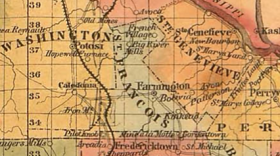
Dr. Bill Eddleman
Host, Tales from Days Gone ByBill Eddleman was born in Cape Girardeau, and is an 8th-generation Cape Countian. His first Missouri ancestor came to the state in 1802. He attended SEMO for two years before transferring to the University of Missouri to study Fisheries and Wildlife Biology. He stayed at Mizzou to earn a master of science in Fisheries and Wildlife, and continued studies in Wildlife Ecology at Oklahoma State University.
Bill’s professional interests were in ornithology (the study of birds) and wildlife management. Upon earning his Ph.D., he worked for the Missouri Department of Conservation, did postdoctoral research at the University of Wyoming, and then joined the Natural Resource Sciences faculty at the University of Rhode Island in 1988. He moved back to Cape Girardeau to take a similar position in the Department of Biology at SEMO in 1995. He continued in the Biology Department and several administrative positions until retiring in 2016.
Bill has always had an interest in local history and genealogy. His familiarity with Southeast Missouri history was the primary reason he became Associate Director for the State Historical Society at its Cape Girardeau Research Center in 2017. At the center, he promotes donations to their manuscript collections, provides history-themed programs for groups in their 15-county coverage area, and assists patrons with research. His own historical research interests include mainly 19th-century Southeast Missouri history, especially the Civil War era and early settlement period.
In his spare time, he serves as president of both the Missouri Birding Society and the Missouri State Genealogical Association. He and his wife Hope also reenact Civil War era history, and are active members of the Friends of Fort D in Cape.
-
In 1869, the lawyer and future railroad entrepreneur and historian Louis Houck rode the court circuit to Kennett with other lawyers and court officials. Upon reaching a point south of Bloomfield, as he later wrote, “I sat down on a hillside on the left of where Dexter now stands, looking over a vast forest of timber on all sides, greatly impressed; not a single farm in sight or opening in the vast woods except at the foot of the hill, an open place known as Miller’s Farm. Going south for miles we traveled along the edge of what was known as the East Swamp, all covered with heavy timber.”
-
Economic conditions boomed in Missouri and the country in 1835. The cotton market and prices increased throughout the South, resulting in increased land purchases and growing demand for enslaved workers. Across the Lead Belt of southeast Missouri, rising lead production and increased demand for furs fueled the boom conditions.
-
On a summer’s day in July 1926, a reporter for the Cape Girardeau Southeast Missourian noticed an old man sitting in Courthouse Park across the street from the newspaper. The reporter greeted the man, who introduced himself as William A. Bacon, a Union Civil War veteran who had just celebrated his 80th birthday.
-
The area around Arcadia in Iron County first became known to many young people of the mid and late 20th Century as a place to go to summer camp. Many of these camps were church camps and remain, although they are not as popular as they once were.
-
Not that long ago, a frequent practice of local newspapers was to have a representative of communities in their circulation area report on happenings in those smaller towns. Some of the reports give valuable insight into local history, while others border on gossip.
-
When the U. S. declared war on Japan and Germany at the end of 1941, mobilization of the armed forces began immediately. An acute need for fighter pilots required that training had to begin as soon as possible. The War Department acquired several new sites for airfields, including 2900-acre site four miles north of Malden in Dunklin County.
-
One of the longest-running local breweries in southeast Missouri, Old Appleton Brewery, started with a German immigrant, Caspar Ludwig.
-
One of the first American settlements in the Ste. Genevieve District was at a cluster of land grants on the west side of Rivere Grande, or Big River, in present-day St. Francois County.
-
Among all the stories in Southeast Missouri history that have sparked tales of ghosts and hauntings is one that should have but has not.
-
Few people realize that the family of James, or Jim, Bowie, who made the Bowie Knife famous and later died at The Alamo, spent time in Southeast Missouri at the beginning of the 19th Century.










